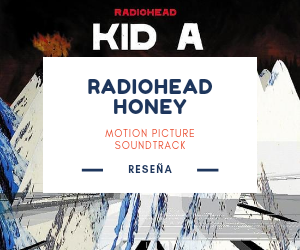
El álbum Kid A de Radiohead destaca por ser uno de los emprendimientos más arriesgados de la banda y a la vez uno de los discos favoritos dentro del fandom. Canciones poderosas como The National Anthem y How To Disappear Completely llenan el catálogo de nuevos sonidos que sucedieron al muy exitoso OK Computer. Pero para esta reseña no me detendré en los temas políticos o filosóficos que nos sugiere Kid A, sino que iré directamente al final del álbum, donde se pierde una canción trágica de amor.
Radiohead's Kid A album stands out for being one of the band's riskiest ventures and at the same time one of the favorite albums within the fandom. Powerful songs like The National Anthem and How To Disappear Completely fill the catalog with new sounds that succeeded the very successful OK Computer. But for this review I will not dwell on the political or philosophical themes that Kid A suggests to us, but I will go directly to the end of the album, where a tragic love song is lost.
Motion Picture Soundtrack (MPS) es una canción increíblemente hermosa que tal vez por fuerza de las emociones encontradas ha llegado a ser reconocida como una de las peores canciones de Radiohead, así como una de las más tristes —esa última valoración con más fundamento—. Advierto que no pretendo discutir tales criterios, solo introducir la obra. Según declaraciones de Yorke, MPS fue compuesta antes de Creep, y se sabe que la banda valoró incluirla en OK Computer; pero acabó durmiendo al final de Kid A tras todas las sesiones que habían dejado insatisfecho a Thom. Aunque la canción ya se conocía en la presentaciones en vivo de la banda desde 1997, absorbió todo el espíritu del álbum y resultó ser una mezcla de instrumentos con samples, más un final intrigante con un instrumental entre largos silencios —que recuerda al final de A day in the life en el Sgt Pepper de The Beatles, álbum con el cual se suele relacionar Kid A.
Motion Picture Soundtrack (MPS) is a song stunningly beautiful that maybe by the force of the emotions, it has come to be recognized as one of the worst songs of Radiohead, as well as one of the saddest —that last assessment with a foundation—. I warn that I do not intend to discuss such criteria, only to introduce the work. According to Yorke's statements, MPS was composed before Creep, and it is known that the band valued including it in OK Computer; but he ended up sleeping at the end of Kid A after all the sessions that had left Thom dissatisfied. Although the song was already known in the band's live performances since 1997, it absorbed the whole spirit of the album and turned out to be a mix of instruments with samples, plus an intriguing ending with an instrumental between long silences — reminiscent of the end of A day in the life on Sgt Pepper of The Beatles, album with which Kid A is usually associated.
La propia música de MPS sugiere la idea básica a la que apela la banda. La intervención del órgano junto a las arpas sampleadas y las voces, hacen un guiño a la composición musical de las viejas películas de Disney. Yorke hablaba de una ilusión rota producida por este monopolio cultural: "It's not like the movies", declara frente a un desenlace no deseado, ante la fractura del "felices por siempre". En este sentido mucho se ha discutido en las últimas décadas, los vicios del amor romántico, los estereotipos que produce Disney y conservan determinadas estructuras de dominación al interior de las relaciones sexo-afectivas. De esto habla la canción en primera instancia, y lo resuelve dentro del esquema sonoro que identifica al tipo de relación que critica. Sin embargo, MPS también se arriesga a dudar alrededor de este conflicto.
MPS' own music suggests the basic idea to which the band appeals. The intervention of the organ together with the sampled harps and the voices, make a nod to the musical composition of the old Disney movies. Yorke spoke of a broken illusion produced by this cultural monopoly: "It's not like the movies", he declares in front of an unwanted outcome, before the fracture of the "happily ever after". In this sense, much has been discussed in recent decades, the vices of romantic love, the stereotypes that Disney produces and preserve certain structures of domination within sex-affective relationships. This is what the song talks about in the first instance, and it solves it within the sound scheme that identifies the type of relationship it criticizes. However, MPS also risks hesitating around this conflict.
Cuando Yorke canta "I will see you in the next life" recupera al romanticismo que había sepultado antes. Vemos aquí otra expresión del amor romántico, pero no bajo el velo de "white lies" construido por Disney, sino como tragedia. Para quien acaba consumido por el amor idealizado y encuentra una ruptura inesperada, el dolor acoge la sombra de la muerte (como en las películas) y la reacción más común es la negación ("lucha por tu amor"). Pero en este caso no se trata de eso: hay una racionalidad que rechaza la inestabilidad del vínculo, y asume la necesidad del desenlace como amor fati (una especie de aceptación/resignación al destino). La tragedia se revela en esa lucha de sentimientos, y en la esperanza de volver a empezar en otra vida, lo cual encarna a la vez un motivo religioso, más desarrollado en la última estrofa que no se incluyó en la versión de estudio. Es así como MPS resulta ser no solo una canción bella, sino una tragedia en sí misma, que se traslada impar sobre los tonos del romanticismo.
When Yorke sings "I will see you in the next life" he regains the romanticism he had buried before. We see here another expression of romantic love, but not under the veil of "white lies" built by Disney, but as a tragedy. For those who end up consumed by idealized love and find an unexpected breakup, pain welcomes the shadow of death (as in the movies) and the most common reaction is denial ("fight for your love"). But in this case it's not about that: there is a rationality that rejects the instability of the bond, and assumes the need for the outcome as amor fati (a kind of acceptance/resignation to fate). The tragedy is revealed in that struggle of feelings, and in the hope of starting over in another life, which embodies at the same time a religious motive, more developed in the last stanza that was not included in the study version. This is how MPS turns out to be not just a beautiful song, but a tragedy in itself, which moves odd over the shades of romanticism.
https://m.youtube.com/watch?v=Dsbq_1VEjNs
Motion picture soundtrack:
Red wine and sleeping pills
Help me get back to your arms
Cheap sex and sad films
Help me get back where I belong
I think you're crazy, maybe
Stop sending letters
Letters always get burned
It's not like the movies
They fed us on little white lies
I will see you in the next life.
Estrofa final no incluida en Kid A / Last stanza not included on Kid A:
Beautiful angel
Pulled apart at birth
Limbless and helpless
I can't even recognize you
I think you're crazy, maybe
I will see you in the next life.
Otros artículos del blog:
Points of view: de la madera al trabajo
Radiohead honey: Bodysnatchers

Cuéntame qué te pareció esta reseña original, y si te gustó puedes seguir mi blog para leer este y otros contenidos. La portada fue elaborada por mí utilizando Canva y la portada del álbum Kid A.
Tell me what you thought of this original review, and if you liked it you can follow my blog to read this and other content. The cover was made by me using Canva and the album cover Kid A.
The rewards earned on this comment will go directly to the people sharing the post on Twitter as long as they are registered with @poshtoken. Sign up at https://hiveposh.com.
Congratulations @hamedtoledo! You have completed the following achievement on the Hive blockchain and have been rewarded with new badge(s):
Your next target is to reach 600 upvotes.
You can view your badges on your board and compare yourself to others in the Ranking
If you no longer want to receive notifications, reply to this comment with the word
STOPCheck out the last post from @hivebuzz:
Support the HiveBuzz project. Vote for our proposal!